Behold the Tekoites, the unsung heroes of the Bible, who rebuilt Jerusalem's walls; discover their inspiring legacy and the lessons we can learn today.
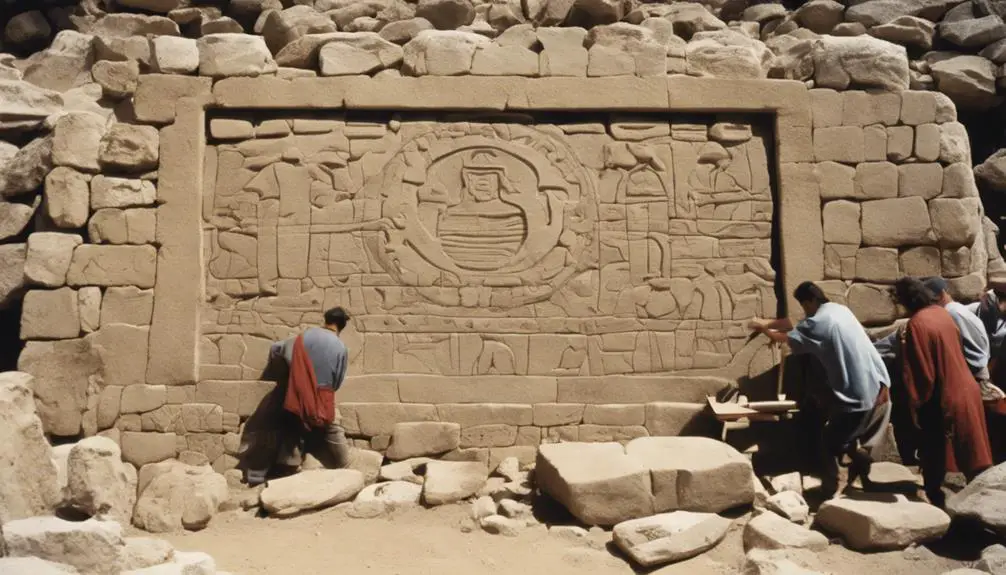
Tekoites in the Bible
Did you know that the Tekoites, a group mentioned in the Bible, are specifically credited for rebuilding the walls of Jerusalem after the Babylonian exile? They're an intriguing group, their dedication and commitment to the reconstruction project is well-documented in the Book of Nehemiah.
You might wonder why this small group received such particular mention. But what if I told you there's more to the Tekoites than meets the eye? There's much to unravel about their role, significance, and the lessons they can teach us today.
Are you ready to discover the mysteries of the Tekoites?
Key Takeaways
- Tekoites, inhabitants of Tekoa, played a significant role in biblical history, particularly in rebuilding Jerusalem's walls.
- They showcased dedication and courage through their participation in various battles, influencing key biblical events.
- Emphasizing unity and cooperation, Tekoites' cultural and religious practices impacted societal norms and religious customs in Judah.
- In biblical interpretations, Tekoites symbolize faith, community, and resilience, emerging as builders of faith and community.
Understanding the Tekoites' Origin
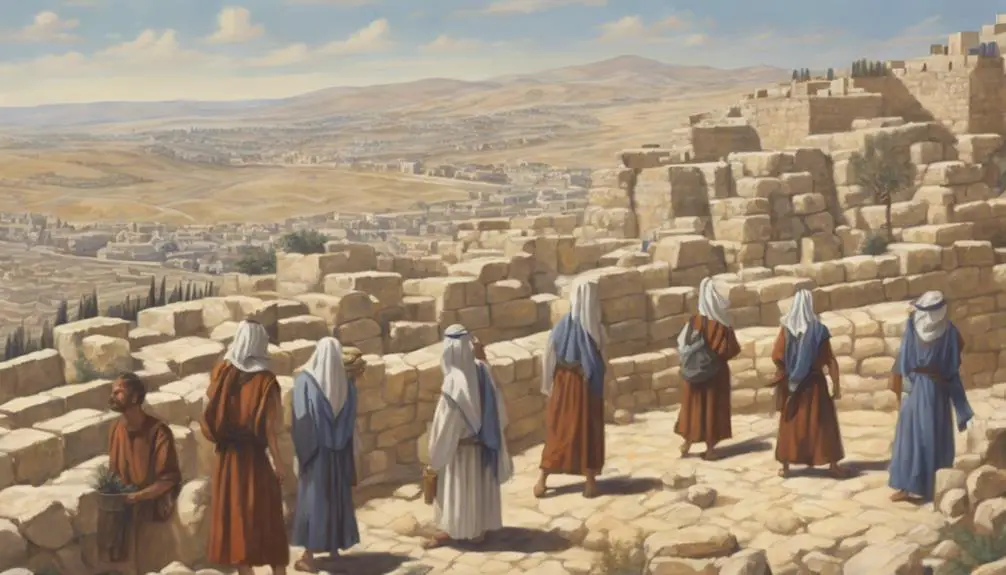
To fully grasp the story of the Tekoites, you need to first delve into their origins, which are deeply rooted in the ancient biblical history. The term 'Tekoites' refers to the inhabitants of the town Tekoa, a small Judaean town in the Bible. This town, south of Bethlehem, is often mentioned in the Old Testament. Tracing the Tekoite genealogy is a complex task due to the scarcity of detailed records, but it's known they were descendants of Ashhur, a son of Caleb.
The Tekoite traditions are another important aspect that helps you understand their culture and lifestyle. They were known for their commitment to community work. The Book of Nehemiah, for instance, mentions the Tekoites repairing Jerusalem's walls not once, but twice. This tradition of collective action indicates their unity and teamwork.
Understanding the Tekoites isn't just about knowing their origins or traditions. It's also about understanding their place in biblical history. They weren't a major tribe, but they played a significant role in the Bible. Their story is a reminder that every group, no matter how small, has a part in the larger narrative.
Significant Tekoites in the Bible
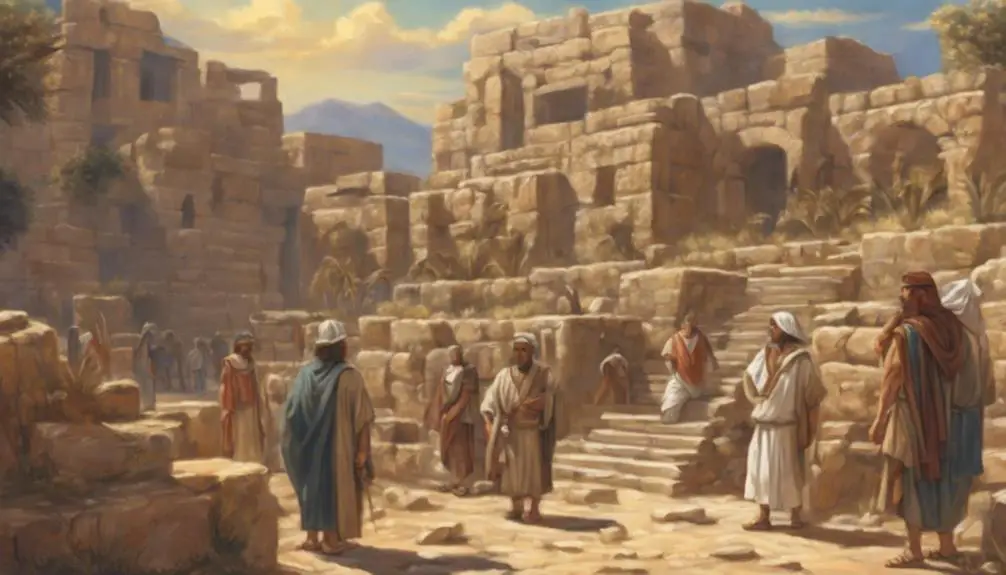
Building on this understanding of their origins and traditions, let's now turn our attention to some individual Tekoites who've made significant contributions in biblical narratives.
The most notable Tekoite in the Bible is Nehemiah's contemporary, a man simply referred to as 'the Tekoite.' His leadership is recognized in the rebuilding of Jerusalem's walls (Nehemiah 3:5, 27). This Tekoite leader and his crew were notable exceptions to the rule, displaying remarkable commitment and dedication. While their nobles wouldn't put their shoulders to the work, the Tekoite workers repaired a second section, a testament to their work ethic and leadership.
There's also the prophet Amos, who though not directly identified as a Tekoite, is believed by some scholars to have had Tekoite origins. His prophecies, often referred to as Tekoite Prophecies, spoke against the injustices and idolatries of his time, pointing people back to a righteous God.
These examples provide a glimpse into the significant role Tekoites played in biblical narratives. Their leadership and prophecies not only shaped their own community but also left an indelible impact on the broader biblical story. Their stories serve as a testament to the influence and legacy of the Tekoites.
Tekoites' Role in Biblical Events
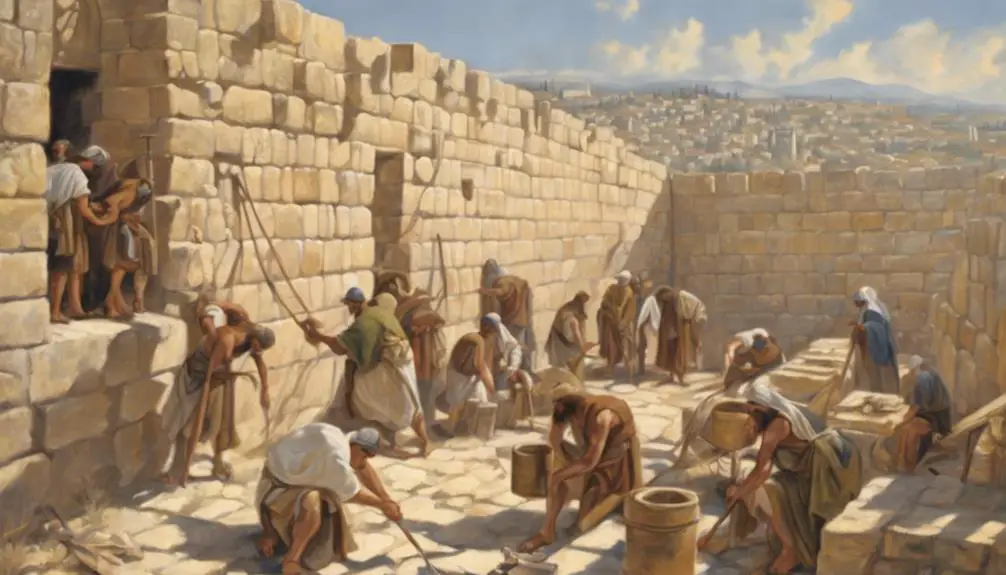
Delving into the numerous biblical events, it's striking to see how the Tekoites significantly shaped pivotal moments, leaving a lasting imprint on biblical history. The Tekoites' influence is evident in many narratives, demonstrating their commitment to their faith and community.
To better understand their significance, let's examine two key events:
Biblical Event |
Tekoites' Role |
|---|---|
Rebuilding of Jerusalem's Walls (Nehemiah 3:5, 27) |
The Tekoites repaired a section of the wall, showing their dedication despite facing opposition. |
Battle against Ammonites and Moabites (2 Chronicles 20) |
Tekoites joined Jehoshaphat's forces in a victorious battle, illustrating their courage and loyalty. |
In both instances, the Tekoites didn't just participate; they displayed exceptional commitment and bravery. Their influence extended beyond their tribe, impacting the course of biblical history. It's clear that the Biblical Tekoites were integral to the community's resilience and spiritual strength.
As you delve deeper into the Bible, you'll find the Tekoites' roles reinforcing their importance in these narratives. This reveals their active participation in shaping the biblical landscape, underscoring the necessity to understand their contributions for a comprehensive view of biblical history. However, remember, their influence wasn't limited to these events but permeated various aspects of life, which we'll explore in the next topic.
Cultural Implications of the Tekoites

Exploring the cultural implications of the Tekoites, you'll find their influence deeply woven into the societal fabric of the biblical era. The Tekoites, a group of people who resided in Tekoa, a town in ancient Judah, had a lasting impact through their unique traditions and religious practices.
The Tekoite traditions reflected their community values. They had a strong emphasis on unity and cooperation, evidenced by their collective efforts in rebuilding the Jerusalem wall, as recorded in the Book of Nehemiah. Furthermore, their commitment to craftsmanship, as seen in their renowned reputation as builders, denotes an appreciation for skill and persistent hard work.
The religious practices of the Tekoites were also significant. They were devout followers of the Mosaic law and took part in religious festivals. Additionally, their regular offerings and sacrifices indicate a profound devotion to their faith.
Moreover, the Tekoites' influence extended beyond their community. Their cultural practices shaped the societal norms and religious customs of the broader region of Judah. Thus, understanding the Tekoites offers a valuable lens to examine the rich cultural tapestry of the biblical period. Ultimately, the Tekoites' cultural attributes provide a unique insight into the social dynamics and religious fervor of the era.
Biblical Interpretations of Tekoites
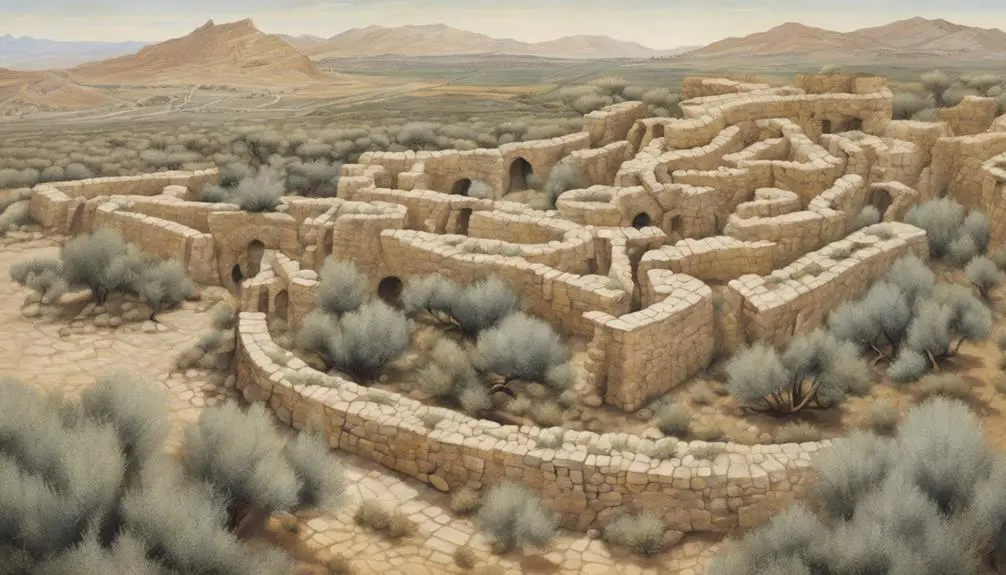
In understanding the biblical narratives about the Tekoites, you'll find their roles and representation deeply intertwined with the broader themes of faith, community, and resilience. The Tekoites' symbolism comes into play here, as their dedication to rebuilding the wall of Jerusalem signifies their steadfast faith and resilient spirit.
However, it's also crucial to unpack potential biblical misinterpretations. While the Tekoites' contribution to the wall's construction is significant, it's easy to misconstrue their absence in battle as a lack of courage or commitment. Instead, you might interpret this as a strategic decision or a reflection of their specialized skills in building, rather than warfare.
Furthermore, you must consider the historical context and cultural nuances when interpreting the Tekoites' actions. Their willingness to work under Nehemiah's leadership, despite their leader's absence, showcases their commitment to the greater good. It underlines the importance of community over individual glory.
The Tekoites, thus, emerge not just as physical builders, but also as builders of faith and community. Their story serves as a powerful reminder of the collective strength that comes from unity and shared purpose, providing a profound lesson for modern readers.
Frequently Asked Questions
What Does the Name 'Tekoite' Mean in the Biblical Context?
You're asking about the meaning of 'Tekoite' without its biblical context.
In a broader sense, Tekoite symbolism relates to origin or belonging, as it denotes people from Tekoa.
However, without the biblical mentions, it's challenging to provide a deeper understanding.
The term 'Tekoite' carries significant weight within the Bible, especially in the books of Nehemiah and Jeremiah.
To fully grasp its meaning, you'd need to delve into its biblical usage.
Are There Any Modern Descendants of the Tekoites Still Living Today?
It's not clear if there are modern descendants of the Tekoites today. Tracing ancient lineages is challenging, especially one as obscure as the Tekoite lineage.
While the Tekoite influence is noted in historical texts, solid evidence of their present-day descendants isn't available. Research into this subject is ongoing, but until concrete findings emerge, it's hard to definitively answer your question.
How Did the Tekoites Interact With Other Tribes During the Biblical Era?
When considering how a group interacts with others, you'd likely look at trade practices and cultural influence.
During their era, the Tekoites likely engaged in commerce with neighboring tribes, exchanging goods and ideas. Their cultural influence might've been seen in shared traditions, beliefs, or customs.
To fully understand these interactions, you'd need to delve into historical records, archaeological findings, and cultural studies.
Are There Any Significant Archaeological Findings Related to the Tekoites?
You're probably curious about significant archaeological findings related to the Tekoites.
While there isn't a wealth of Tekoite artifacts, some evidence does exist. Tekoite architecture, for instance, offers insight into their civilization. Ancient walls and structures reveal their building techniques.
However, it's important to remember that these findings don't provide a complete picture. They're just pieces of a larger puzzle about the Tekoites' way of life.
How Do Different Religious Traditions Perceive the Tekoites?
You're curious about how various faiths view the Tekoites and their contributions. This can vary widely, as religious interpretation often does.
Some may see them as significant contributors to their religious history, while others may not attach much importance to them.
It's crucial to understand that religious significance can be subjective and is shaped by one's own beliefs, interpretations, and personal faith journey.
Conclusion
In understanding the Tekoites' origin and their role in biblical events, you've discovered their significant cultural implications and various interpretations. Remember, the Tekoites aren't merely historical figures but also symbols carrying deep, nuanced meanings.
They're a testament to the multifaceted nature of biblical texts and their enduring relevance. So, keep exploring, keep questioning, and keep learning. Every biblical story, including the Tekoites, is a window into a vast world of wisdom and knowledge.



Sign up